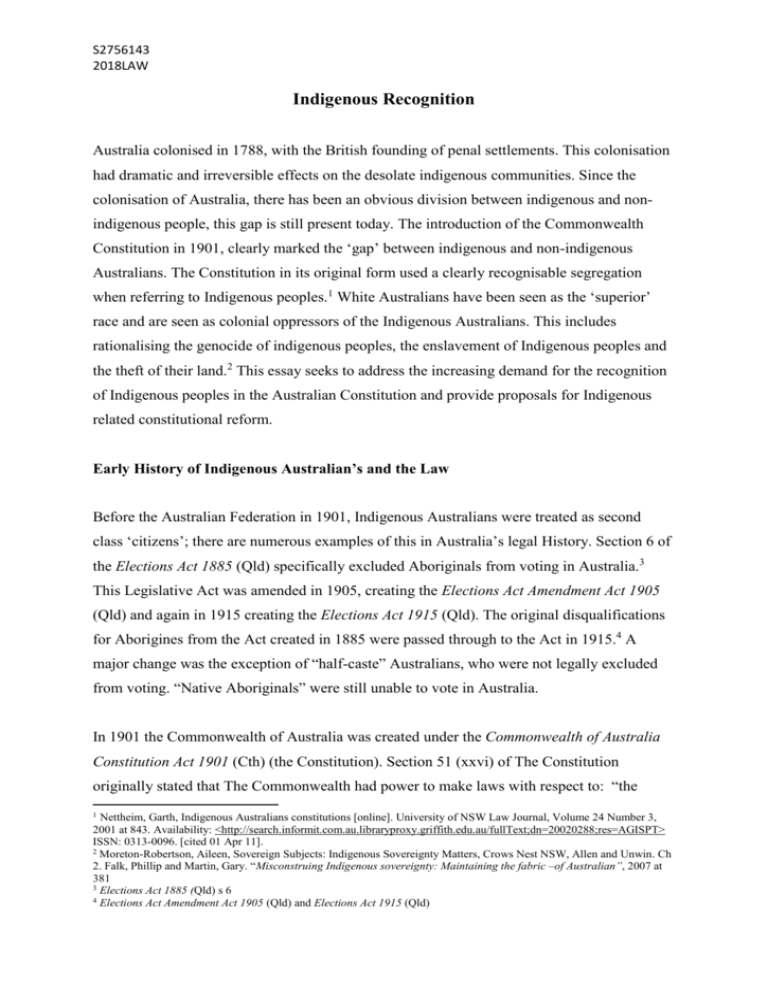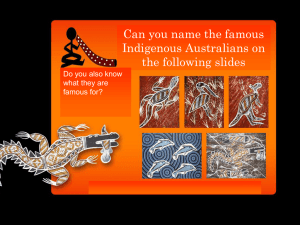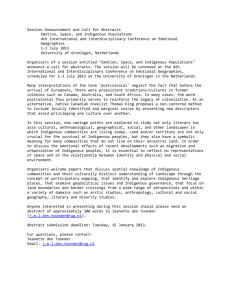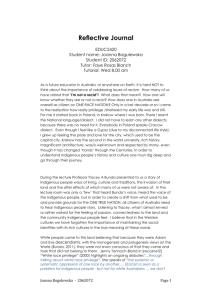Indigenous Recognition
advertisement

S2756143 2018LAW Indigenous Recognition Australia colonised in 1788, with the British founding of penal settlements. This colonisation had dramatic and irreversible effects on the desolate indigenous communities. Since the colonisation of Australia, there has been an obvious division between indigenous and nonindigenous people, this gap is still present today. The introduction of the Commonwealth Constitution in 1901, clearly marked the ‘gap’ between indigenous and non-indigenous Australians. The Constitution in its original form used a clearly recognisable segregation when referring to Indigenous peoples.1 White Australians have been seen as the ‘superior’ race and are seen as colonial oppressors of the Indigenous Australians. This includes rationalising the genocide of indigenous peoples, the enslavement of Indigenous peoples and the theft of their land.2 This essay seeks to address the increasing demand for the recognition of Indigenous peoples in the Australian Constitution and provide proposals for Indigenous related constitutional reform. Early History of Indigenous Australian’s and the Law Before the Australian Federation in 1901, Indigenous Australians were treated as second class ‘citizens’; there are numerous examples of this in Australia’s legal History. Section 6 of the Elections Act 1885 (Qld) specifically excluded Aboriginals from voting in Australia.3 This Legislative Act was amended in 1905, creating the Elections Act Amendment Act 1905 (Qld) and again in 1915 creating the Elections Act 1915 (Qld). The original disqualifications for Aborigines from the Act created in 1885 were passed through to the Act in 1915.4 A major change was the exception of “half-caste” Australians, who were not legally excluded from voting. “Native Aboriginals” were still unable to vote in Australia. In 1901 the Commonwealth of Australia was created under the Commonwealth of Australia Constitution Act 1901 (Cth) (the Constitution). Section 51 (xxvi) of The Constitution originally stated that The Commonwealth had power to make laws with respect to: “the 1 Nettheim, Garth, Indigenous Australians constitutions [online]. University of NSW Law Journal, Volume 24 Number 3, 2001 at 843. Availability: <http://search.informit.com.au.libraryproxy.griffith.edu.au/fullText;dn=20020288;res=AGISPT> ISSN: 0313-0096. [cited 01 Apr 11]. 2 Moreton-Robertson, Aileen, Sovereign Subjects: Indigenous Sovereignty Matters, Crows Nest NSW, Allen and Unwin. Ch 2. Falk, Phillip and Martin, Gary. “Misconstruing Indigenous sovereignty: Maintaining the fabric –of Australian”, 2007 at 381 3 Elections Act 1885 (Qld) s 6 4 Elections Act Amendment Act 1905 (Qld) and Elections Act 1915 (Qld) S2756143 2018LAW people of any race in any state, other than the Aboriginal race in any State, for whom it is deemed necessary to make special laws”.5 Section 127 of The Constitution also stated that “in reckoning the numbers or people of the Commonwealth, or of a State or other part of the Commonwealth, aboriginal natives shall not be counted”.6 In 1902 the Commonwealth Franchise Bill 1902 (Cth) proposed to amend s 41 of The Constitution which would have allowed Indigenous Australians to vote in Queensland and Western Australia (due to the supremacy of State legislation not allowing Indigenous Australians to vote).7 This proposal was rejected in the House of Representatives on 24 April 1902, with one stating Aborigines “have not the intelligence, interest or capacity” to vote,8and another who thought it “utterly inappropriate… [to] ask them to exercise an intelligent vote”.9 These are words spoken by Isaacs and Higgins, both politicians were representing the voice of all ‘Australians’. These controversial sections of the Constitution and other applicable Acts are contributing factors to the separation of Indigenous and non Indigenous Australians. The early legal history regarding Indigenous Australians stipulates the very need for Indigenous recognition in Australia’s Constitution. Justices to Discriminatory Laws Since the creation of the Australian Constitution, there have been numerous just amendments made in regards to the recognition of Indigenous Australians. A successful referendum in 1967 removed the words “other than the Aboriginal race in any state” from s 51 (xxvi) and also s 127 entirely.10 A major leap towards Indigenous justice came with the hearing of Mabo v Queensland (No2) (1992) 175 CLR 1. The High Court made the decision that the land in the Murray Islands was not in fact Crown land.11 This case saw the rejection of the doctrine of terra nullius to 5 Commonwealth of Australia Constitution Act 1901 (Cth) s 51 (xxvi) Commonwealth of Australia Constitution Act 1901 (Cth) s 127 7 Commonwealth Franchise Bill 1902 (Cth) clause 41 8 Hansard, House of Representatives, 24 April 1902, 11979 per Isaac Isaacs 9 Hansard, House of Representatives, 24 April 1902, 11977 per HB Higgins 10 Nettheim, Garth Reconciliation and the Constitution. [online]. University of NSW Law Journal, Volume 22 Number 2, 1999 at 628. Availability: <http://search.informit.com.au.libraryproxy.griffith.edu.au/fullText;dn=20000512;res=AGISPT> ISSN: 0313-0096. [cited 02 Apr 11]. 11 Mabo v Queensland (No2) (1992) 175 CLR 1 (i) per Mason CJ, Brennan, Deane, Toohey, Gaudron and McHugh JJ (Dawson J dissenting): 6 S2756143 2018LAW Australia, and recognised Indigenous land ownership for the first time.12 Until the case of Mabo v Queensland (No2) (1992) 175 CLR 1, there was no legal acceptance that Australia was inhabited by Aboriginal nations with their own legal systems. This case, however still did not overcome the issue of colonial sovereignty. “The court named ‘native title’ vulnerable to extinguishment by the sovereign and the High Court also declared the very sovereignty to be non-justiciable”.13 As the evidence suggests, there have been derogatory and seriously discriminating legislation (namely the constitution), which have been examined and morally corrected, as in the 1967 referendum. Although Australia cannot give back what they have taken from the Indigenous peoples, they have a chance to right the wrongs that the colonisation and the unjust laws have done to their people. After the 1967 referendum, s 51 (xxvi) deleted Indigenous discrimination and s 127 was removed from the Constitution. This however left the Constitution silent with respect to aboriginal people.14The silence of the aboriginal voice in the constitution is a disgrace to the Commonwealth of Australia. In the 21st Century, the Country is established enough to realise that the way Indigenous Australians were treated, and still are treated, is morally wrong. Another Major issue with the Constitution that should have been resolved in the 1967 referendum, is the existence of s 25 which reads, “if by the law of any State all persons of any race are disqualified from voting at elections for the more numerous House of the Parliament of the State, then, in reckoning the number of the people of the State or of the Commonwealth, persons of that race resident in that State shall not be counted.”15 Section 25 of the constitution is unmistakably a hindrance towards Indigenous acceptance and recognition, as it gives State legislation the ability to exclude any race from voting. In Motha, Stewart and Perrin, Colin. Deposing Sovereignty after Mabo, In “Law and Critique” Volume 13, Number 3, Kluwer Law International, 2002 at 231. 13 Motha, Stewart and Perrin, Colin. Deposing Sovereignty after Mabo, In “Law and Critique” Volume 13, Number 3, Kluwer Law International, 2002 at 231. 14 Blackshield, Tony and Williams, George, Australian Constitutional Law and Theory, 5ht Edition, The Federation Press, Sydney, 2010 at Page 154 15 Commonwealth of Australia Constitution Act 1901 (Cth) s 25 12 S2756143 2018LAW latter-day Australia, this type of discrimination should no longer be present among our society. Recommended Reforms The implications of these laws on Indigenous Australians will perhaps never be rectified, and will certainly never be forgotten, however something must be done to achieve social autonomy. The issue of Indigenous sovereignty in Australia is a very fragile topic. Behrendt successfully sums up the problem when stating, “The recognition of Indigenous sovereignty is not a threat to the sovereignty of the Australian State but it does question the legitimacy of that authority, accuses it of historically excluding Indigenous people and of continuing that exclusion today. It seeks a fundamentally different relationship, one which will change through a range of initiatives that, in totality, can be characterised as self-determination.”16 A research brief written by Davis and Lino, perfectly expresses the forms of action which should be taken for Indigenous recognition. The brief looks at the recognition of Indigenous Australians within the Constitution. The main proposed amendments are: A non-discrimination provision A new preamble recognising Aboriginal and Torres Strait Islander peoples Amendment or deletion of the ‘race power’ (s 51 (xxvi)) Deletion of s 25 A provision providing for agreement-making between Indigenous peoples and the state Recognition of pre-existing Aboriginal land rights or native title.17 The constitution, ideally, should have all of these proposals construed within it to create the most autonomous society possible. However, Davis and Lino insisted that the first four proposals are the most likely to happen in the near future.18 Behrendt L Achieving Social Justice: Indigenous Rights and Australia’s Future, Federation Press, Sydney, 2003 at 103 Davis M and Lino D ‘Constitutional reform and Indigenous peoples’, Research Brief No.3, Indigenous Law Centre, University of New South Wales, 2011 at 3 16 17 S2756143 2018LAW Non-discrimination Provision A very important proposal, which would have a positive impact on the Australian society, would be the inclusion of a non-discrimination provision. The provision would indicate that Australia is an autonomous State which does not racially discriminate. It would allow the Australian community to coincide collectively as one nation, not regarding race or colour, but of origin. This provision would not only benefit Indigenous Australians, but all Australians who could be susceptible to racial discrimination. Preamble recognising Indigenous Australians A preamble recognising Aboriginal and Torres Strait Islander peoples is mandatory for the greater good of the nation. This preamble would include the acknowledgement that Aboriginals and Torres Strait Islanders were inhabitants of Australia before the first British settlement. The insertion of a new paragraph stating who the original inhabitants were would assist in recognising Indigenous Australians and would allow the Australian Constitution to embrace the history of Australia. Deletion of s 51 (xxvi) and s 25 Section 51 (xxvi) of the Constitution should be deleted in order to foster the acceptance of anti-racial discrimination in the countries legal system. Section 25 of the Constitution should also be deleted so that State legislation cannot forbid a certain race from voting in Federal Elections. These amendments would create a fair and equitable Constitution for today’s contemporary society. In order for the State to recognise the Indigenous Australians as original inhabitants, with pre-colonial laws, the Constitution must be amended. Not until correct measures are taken, and Indigenous Australians have honoured legal recognition, will Australia be free from the current colonial regime. The above mentioned amendments need to be made to the Constitution in order for the nation of Australia to move towards social and legal autonomy. 18 Davis M and Lino D ‘Constitutional reform and Indigenous peoples’, Research Brief No.3, Indigenous Law Centre, University of New South Wales, 2011 at 3 S2756143 2018LAW Reference List Authored Works Behrendt L Achieving Social Justice: Indigenous Rights and Australia’s Future, Federation Press, Sydney, 2003 at page 103 Blackshield, Tony and Williams, George, Australian Constitutional Law and Theory, 5th Edition, The Federation Press, Sydney, 2010 at 154 Davis M and Lino D ‘Constitutional reform and Indigenous peoples’, Research Brief No.3, Indigenous Law Centre, University of New South Wales, 2011 at page 3 Falk P and Martin G, ‘Misconstruing Indigenous sovereignty: maintaining the fabric of Australian law’, in Moreton-Robinson A (ed) Sovereign Subjects: Indigenous Sovereignty Matters, Allen & Unwin, Crows Nest, NSW, 2007, 33-46 Kidd R ‘State controls of Aboriginal families and finances’, Speech delivered to the Brisbane School of Distance Education, August 2004 Moreton-Robertson, Aileen, Sovereign Subjects: Indigenous Sovereignty Matters, Crows Nest NSW, Allen and Unwin. Ch 2. Falk, Phillip and Martin, Gary. “Misconstruing Indigenous sovereignty: Maintaining the fabric –of Australian”, 2007 at 381 Motha, Stewart and Perrin, Colin. Deposing Sovereignty after Mabo, In “Law and Critique” Volume 13, Number 3, Kluwer Law International, 2002 at 231. Nettheim, Garth, Indigenous Australians constitutions [online]. University of NSW Law Journal, Volume 24 Number 3, 2001 at 843. Availability: <http://search.informit.com.au.libraryproxy.griffith.edu.au/fullText;dn=20020288;res=AGIS PT> ISSN: 0313-0096. [cited 01 Apr 11]. Nettheim, Garth Reconciliation and the Constitution. [online]. University of NSW Law Journal, Volume 22 Number 2, 1999 at 628. Availability: <http://search.informit.com.au.libraryproxy.griffith.edu.au/fullText;dn=20000512;res=AGIS PT> ISSN: 0313-0096. [cited 02 Apr 11]. Cases Mabo v Queensland (No2) (1992) 175 CLR 1 (i) per Mason CJ, Brennan, Deane, Toohey, Gaudron and McHugh JJ (Dawson J dissenting): Legislation Commonwealth of Australia Constitution Act 1901 (Cth) s 51 (xxvi) Commonwealth of Australia Constitution Act 1901 (Cth) s 127 Elections Act Amendment Act 1905 (Qld) S2756143 2018LAW Elections Act 1885 (Qld) s 6 Elections Act 1915 (Qld) Hansard, House of Representatives, 24 April 1902, 11979 per Isaac Isaacs Hansard, House of Representatives, 24 April 1902, 11977 per HB Higgins






